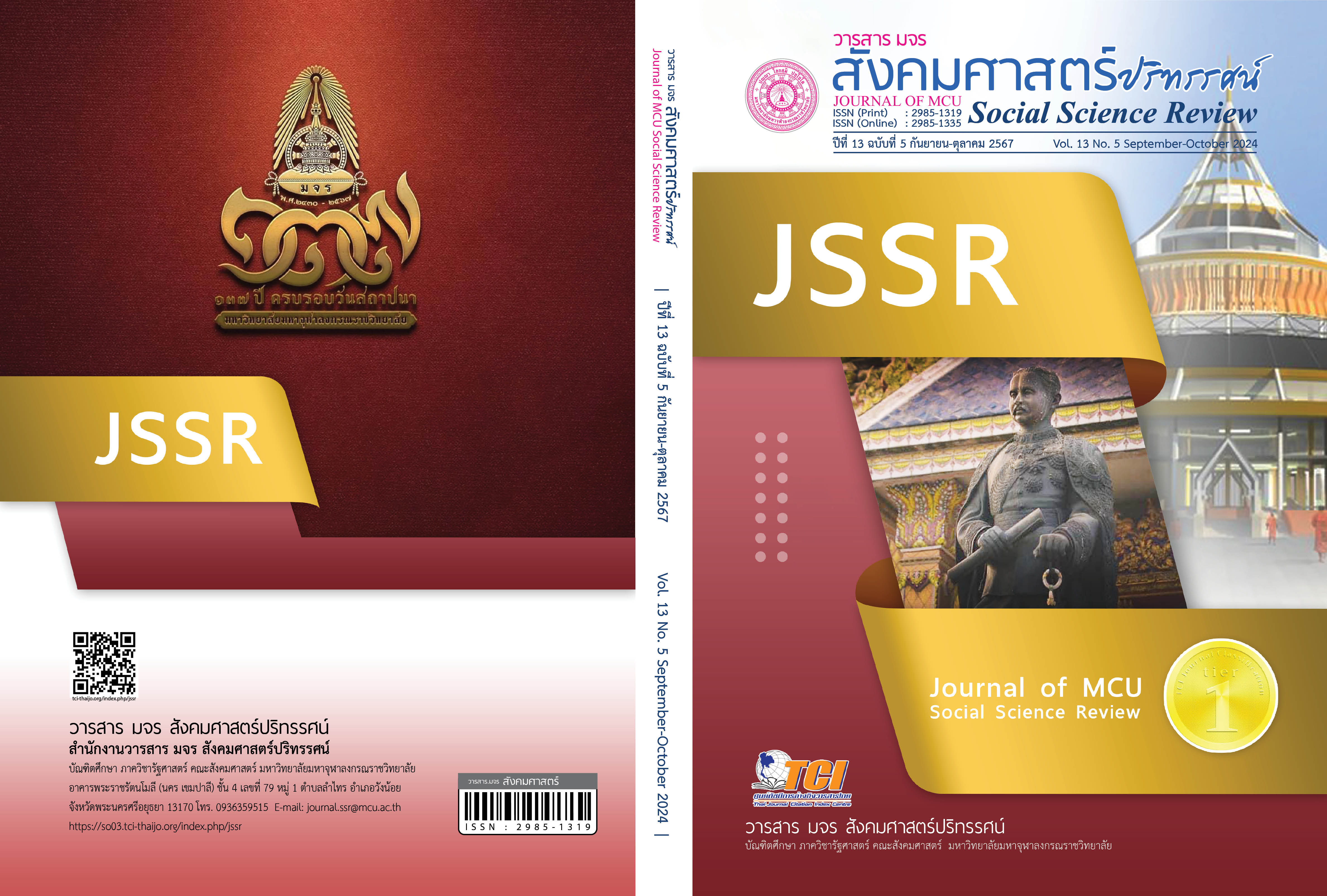การพัฒนารูปแบบการเรียนการสอนตามแนวคิดการเรียนรู้ที่เน้นกิจกรรม เพื่อส่งเสริมการเป็นผู้สร้างสรรค์นวัตกรรมในวิชาภาษาไทย สำหรับนักศึกษา สาขาวิชาการประถมศึกษา
คำสำคัญ:
รูปแบบการเรียนการสอน, แนวคิดการเรียนรู้ที่เน้นกิจกรรม, สร้างสรรค์นวัตกรรมบทคัดย่อ
บทความวิจัยนี้มีวัตถุประสงค์ 1. พัฒนารูปแบบการเรียนการสอน และ 2. ศึกษาผลการใช้รูปแบบการเรียนการสอน และ 3. ศึกษาความพึงพอใจของนักศึกษาที่มีต่อรูปแบบการเรียนการสอน การวิจัยนี้ดำเนินการตามระเบียบวิธีวิจัยและพัฒนา ผ่านการประเมินคุณภาพโดยผู้ทรงคุณวุฒิ จำนวน 5 คน ตัวอย่างคือ นักศึกษาสาขาวิชาการประถมศึกษา จำนวน 32 คน เครื่องมือที่ใช้ในการวิจัย ประกอบด้วย 1. แบบประเมินรูปแบบ 2. แบบทดสอบความรู้ 3. แบบประเมินความสามารถในการสร้างสรรค์ผลงาน 4. แบบวัดเจตคติที่มีต่อวิชาภาษาไทย และ 5. แบบประเมินความพึงพอใจ
ผลการวิจัยพบว่า 1. ได้รูปแบบการเรียนการสอนที่มีองค์ประกอบ 6 องค์ประกอบ ได้แก่ 1. หลักการ 2. วัตถุประสงค์ 3. ขั้นตอนการจัดกิจกรรมการเรียนรู้มี 5 ขั้นตอน คือ ขั้นตอนการรับรู้ประสบการณ์ ขั้นตอนกำหนดเป้าหมาย ขั้นตอนการสร้างนวัตกรรม ขั้นตอนการนำนวัตกรรมไปใช้และ ขั้นตอนการสะท้อนคิดถอดบทเรียน 4. สื่อและแหล่งเรียนรู้ที่สนับสนุนการใช้รูปแบบ 5. บทบาทผู้เรียนและผู้สอน 6. การวัดและประเมินผล โดยมีผลการประเมินความเหมาะสม อยู่ในระดับมากที่สุด 2. ผลการใช้รูปแบบการเรียนการสอน พบว่า ระดับคะแนนความรู้ ระดับความสามารถในการสร้างสรรค์ผลงานนวัตกรรม และระดับเจตคติของนักศึกษาที่มีต่อวิชาภาษาไทย หลังทดลองสูงกว่าก่อนการทดลองอย่างมีนัยสำคัญทางสถิติที่ระดับ .05 และนักศึกษามีความพึงพอใจต่อรูปแบบการเรียนการสอนโดยรวมอยู่ในระดับมากที่สุด
เอกสารอ้างอิง
คะเณยะ อ่อนนาง. (2564). ผลการจัดการเรียนรู้เชิงรุกที่มีต่อผลสัมฤทธิ์ทางการเรียนทักษะการจัดการเรียนรู้ และเจตคติต่อวิชาชีพครูของนักศึกษาวิชาชีพครู. ศึกษาศาสตร์สาร, 5(2), 15-24.
ชนสิทธิ์ สิทธิ์สูงเนิน และเอกสิทธิ์ ชนินทรภูมิ. (2564). พัฒนากิจกรรมการเรียนการสอนโดยใช้กิจกรรมเป็นฐานเพื่อส่งเสริมความสามารถในการออกแบบการจัดกิจกรรมการเรียนรู้อย่างสร้างสรรค์ของนักศึกษาครู คณะศึกษาศาสตร์ มหาวิทยาลัยศิลปากร. วารสารวิชาการมหาวิทยาลัยราชภัฏเพชรบุรี, 11(2), 38-48.
ทิศนา แขมมณี. (2557). ศาสตร์การสอน : องค์ความรู้เพื่อการจัดกระบวนการเรียนรู้ที่มีประสิทธิภาพ (พิมพ์ครั้งที่ 21). กรุงเทพฯ: สำนักพิมพ์แห่งจุฬาลงกรณ์มหาวิทยาลัย.
นทัต อัศภาภรณ์ และคณะ. (2560). การวิเคราะห์ความสอดคล้องของกระบวนวิชากลุ่มวิชาชีพครูกับมาตรฐานความรู้ของคุรุสภา. เชียงใหม่: มหาวิทยาลัยแม่โจ้.
พฤทธิ์ ศิริบรรณพิทักษ์. (2563). กฎแห่งความสำเร็จในยุคหุ่นยนต์โลกาภิวัตน์. วารสารการบริหารและนวัตกรรมการศึกษา, 3(1), III-IV.
สมเกียรติ อินทสิงห์ และคณะ. (2561). ความพึงพอใจของนักศึกษาที่มีต่อคุณภาพของหลักสูตรและเจตคติต่อวิชาชีพครูของนักศึกษาวิชาชีพครู สาขาวิชาภาษาไทย มหาวิทยาลัยเชียงใหม่. วารสารศึกษาศาสตร์ปริทัศน์, 33(1), 33-40.
สำนักงานเลขาธิการสภาการศึกษา. (2562). แผนการปฏิรูปประเทศด้านการศึกษา. กรุงเทพฯ: สำนักงานเลขาธิการสภาการศึกษา.
สุกัญญา แช่มช้อย. (2565). การบริหารสถานศึกษาเพื่อสร้างนวัตกรรุ่นเยาว์ (พิมพ์ครั้งที่ 2). กรุงเทพฯ: สำนักพิมพ์แห่งจุฬาลงกรณ์มหาวิทยาลัย.
อรชร วัฒนกุล. (2553). พัฒนารูปแบบการเรียนการสอนวิชาภาษาไทยเพื่อการสื่อสารในการส่งเสริมความคิดสร้างสรรค์ สำหรับนักศึกษาปริญญาตรี มหาวิทยาลัยรัตนบัณฑิต (ดุษฎีนิพนธ์การศึกษาดุษฎีบัณฑิต สาขาวิชาการอุดมศึกษา). กรุงเทพฯ: มหาวิทยาลัยรัตนบัณฑิต.
Mc Clelland, D. C. (1998). Identifying competencies with behavioral-event interviews. Psychological Science, 9(5), 331-339.
Ornstein, A. C. & Hunkins, F. P. (2014). Curriculum Foundations, Principles, and Issues (6th ed.). USA: Pearson Education Limited.
ดาวน์โหลด
เผยแพร่แล้ว
รูปแบบการอ้างอิง
ฉบับ
ประเภทบทความ
สัญญาอนุญาต
ลิขสิทธิ์ (c) 2024 วารสาร มจร สังคมศาสตร์ปริทรรศน์

อนุญาตภายใต้เงื่อนไข Creative Commons Attribution-NonCommercial-NoDerivatives 4.0 International License.
เพื่อให้เป็นไปตามกฎหมายลิขสิทธิ์ ผู้นิพนธ์ทุกท่านต้องลงลายมือชื่อในแบบฟอร์มใบมอบลิขสิทธิ์บทความให้แก่วารสารฯ พร้อมกับบทความต้นฉบับที่ได้แก้ไขครั้งสุดท้าย นอกจากนี้ ผู้นิพนธ์ทุกท่านต้องยืนยันว่าบทความต้นฉบับที่ส่งมาตีพิมพ์นั้น ได้ส่งมาตีพิมพ์เฉพาะในวารสาร มจร สังคมศาสตร์ปริทรรศน์ เพียงแห่งเดียวเท่านั้น หากมีการใช้ภาพหรือตารางหรือเนื้อหาอื่นๆ ของผู้นิพนธ์อื่นที่ปรากฏในสิ่งตีพิมพ์อื่นมาแล้ว ผู้นิพนธ์ต้องขออนุญาตเจ้าของลิขสิทธิ์ก่อน พร้อมทั้งแสดงหนังสือที่ได้รับการยินยอมต่อบรรณาธิการ ก่อนที่บทความจะได้รับการตีพิมพ์ หากไม่เป็นไปตามข้อกำหนดเบื้องต้น ทางวารสารจะถอดบทความของท่านออกโดยไม่มีข้อยกเว้นใดๆ ทั้งสิ้น





